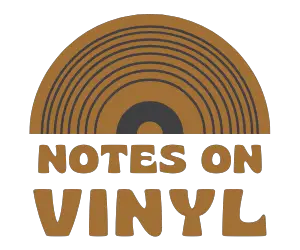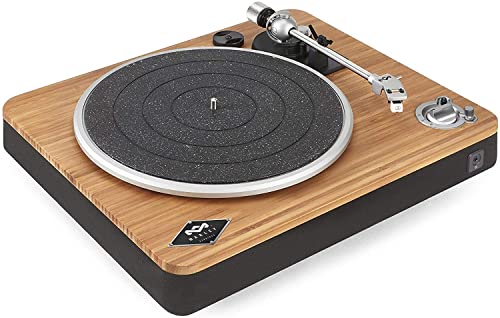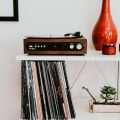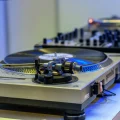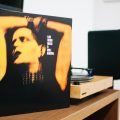Today we will be exploring some examples of the best turntables under $300, turntables full of character and personality that are not going to use all that personality to weigh your pockets down with hooky claws.
Table of Contents
- What to Look For in the Best Turntables Under $300
- 1. Denon DP-29F
- 2. Audio Technica AT-LP60-BT
- 3. Fluance RT81
- 4. House of Marley Stir It Up Wireless
- 5. Fluance RT-82
- Final Tones
- FAQs Best Turntable Under $300
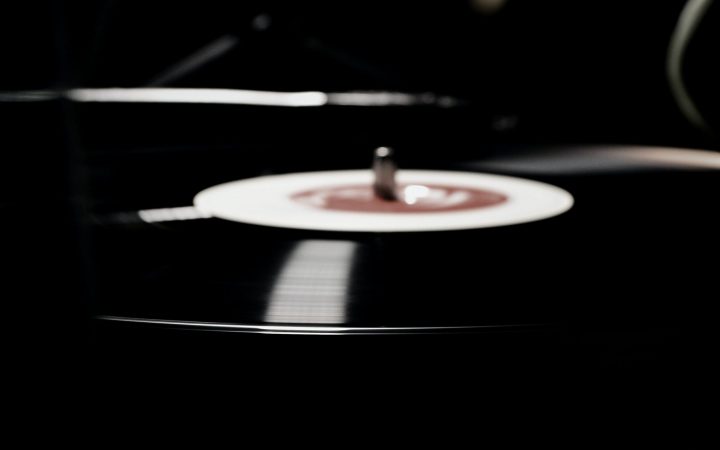
| Image | Title | Price | Prime | Buy | Buy |
|---|---|---|---|---|---|
 | Denon DP-29F | PrimeEligible | Buy Now | Buy Denon DP-29F | |
 | Audio-Technica AT-LP60X-BK | PrimeEligible | Buy Now | Buy Audio-Technica AT-LP60X-BK | |
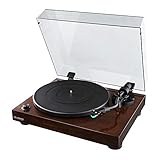 | Fluance RT81 | Prime | Buy Now | Buy Fluance RT81 | |
 | House of Marley Stir It Up | PrimeEligible | Buy Now | Buy House of Marley Stir It Up | |
 | Fluance RT82 | Prime | Buy Now | Buy Fluance RT82 |
What to Look For in the Best Turntables Under $300
When purchasing a record player, the discerning eye of everyone will be slightly different, though there are a few things that each consumer ought to look for:
Preamp
Often the best turntable under $300 will come without a built in phono preamp. This is a part of turntables that has become more and more commonplace compared to the original vinyl era when the built in preamp would have been sold separately.
This preamp essentially increases the relatively weak signal output of the turntable to a level where it can be received and interpreted by a normal stereo amplifier.
This is a more or less essential aspect of listening to records, one that is oft neglected by higher end models which encourage you to purchase your own separate preamp with your own discerning ears, your own built in phono equalizer.
Cartridge
Being one of the few parts of the record player that actually comes into contact with the record itself, this mechanism is of particular importance. The quality of the cartridge is going to have a direct impact on the sound quality of the eventual outcome, sometimes even more than the speakers or stereo itself.
If you are working on a budget, then you can’t really go wrong with anything by Audio Technica, for they sure know how to make a turntable and a turntable cartridge replacement.
A Crosley will not be able to offer quality sound, hence why most audiophiles suggest replacing the cartridge that comes built in from the factory straight away.
Though still not the greatest route to go down if you really care about having a decent turntable, the sound quality will be vastly improved if you choose not to use the cartridge that Crosley include with their own record players.
Tonearm
Oft neglected, the tonearm plays a still central role in the overall sound response of a record player, in much the same way that the streaming platform of digital files might impact the overall quality of files heard.
If the best quality possible is desired for the playback of vinyl recordings, then the tonearm will need to be of decent quality. This means that it must be constructed from materials that do not resonate and should also feature an adjustable counterweight on its back end.
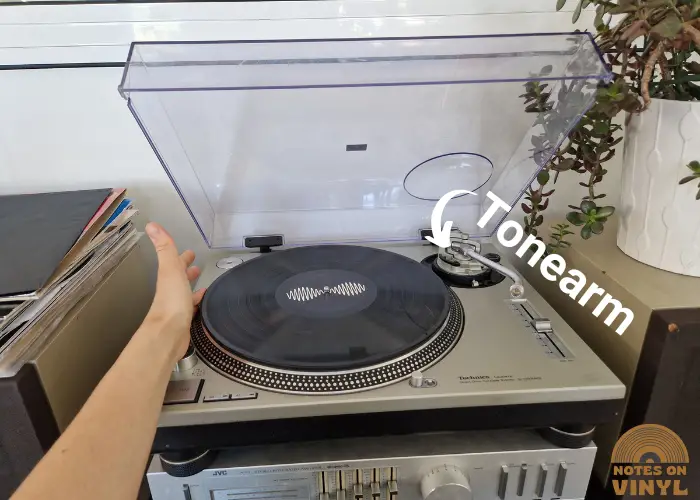
This latter feature is seldom seen on record players at this price range and so should be coveted at all costs if you do come across one. The counterweight works to ensure that as little weight as possible is exerted onto the face of the record while still allowing the music to play back.
The lighter the touch of a tonearm, the longer a record can last before it eventually deteriorates as all records are destined to.
Plinth & Platter
The materials from which the plinth and platter of a turntable are constructed from can have a direct and noticeable effect on the overall quality of the sound when it reaches the ears of the listener.
The best examples of plinths and platters beneath $300 will usually be on a belt drive turntable; they will feature strong and dense aluminum plinths and weighted platter that help to reduce the overall negative resonance greatly.
Though incredibly useful, you are unlikely to come across a solid wood plinth in this price range, even despite how well it can absorb extraneous vibrations and prevent the same resonances from being emitted from the record player onto the objects which it comes into contact with, offering a bigger, better sound quality when playing vinyl records.
1. Denon DP-29F
Over the years, Denon has made quite a name for itself. Though they have been around for well over a century, it was in the 1930s that they really hit a stride and started manufacturing their own turntables and designing their own tonearms, earning a reputation as one of the best at the job.
Their flagship model – the Denon DP-300F – is the foundation upon which their reputation is laid, but this vessel right here, though slightly more affordable, is no less able to get the job done.
This is a fully automatic turntable driven by a belt and with a fully removable hinged dust cover. For the price, this turntable is replete with many of the same features that you would expect in a far more expensive model, only just falling short of putting the RCA cables straight into your awaiting hands.
Pro’s
- Comes with a removable dust cover that is easily replaced thanks to the inbuilt hinge mechanism.
- The design is sleek and minimal, having evolved over the years thanks to its big brother, the Denon DP-300F.
- Very few controls and buttons get in the way of the user experience, making this a record player that is fun and easy to use.
- Perfectly suited for more vintage styles of music, like jazz and classical.
Con’s
- Since there is no way to attach an external preamplifier, any user will have to make do with the preamplifier that Denon built in themselves.
2. Audio Technica AT-LP60-BT
As previously mentioned, you really cannot go wrong with Audio Technica, especially if you are working on a fairly tight budget. They have a number of manual turntables within this price range which will be of note to those looking to use their turntable to spin discs for people. This, however, is a classic for those just getting into record collecting.
I have a number of friends who still to this day use this turntable because it just suits their style of collecting which is laid back and simple, not fussing too much about all the technological particulars.
With a fairly balanced frequency response across the board, you can’t really go wrong with this affordable and robust offering from trusted audio institution Audio Technica, with clear highs and deep lows (and everything in between)!
Pro’s
- Highly portable, so if you are ever in a situation where your turntable needs to be used for decks then you are ready to go!
- Available in a whole range of different colors to satisfy the artist within you all.
- It is fun and easy to operate, prizing user enjoyment over any technological interference.
- The build is surprisingly strong and sturdy considering the price and the building supplies of plastic.
- Bluetooth connectivity is a must for all those millennial users!
Con’s
- The Bluetooth aspects are a little frustrating to use at first and not quite as smooth as they could be.
3. Fluance RT81
Forget trying to find the best turntable under 300 dollars, this record player is less than $250, though you would never be able to tell from just looking at it.
With heavy construction and strong plinth feet, this is a clear improvement on the RT80, even going so far as to improve on the cartridge by including an Ortofon 2M red cartridge as standard on the lightweight tonearm.
Fluance has also sought to improve upon the motor which some believed was a little too heavy-duty. Now, there is improved torque and greater accuracy for the speed at which the turntable platter spins, ensuring that the belt lasts for longer and is more accurate during its lifespan.
Pro’s
- The design thoroughly belies the low price, with a wood-like veneer giving off the impression of a far more expensive piece of equipment, as well as a solid base and plinth that ensures there will be as little interference from extraneous vibrations as possible.
- Features a new and improved belt drive (with a thermoplastic elastomer belt – better equipped to withstand the hard work underneath the hood), reducing the cogging of the platter by up to 50%.
- Straightforward and easy enough to use that anyone could do so.
Con’s
- The speed controls are a little difficult to reach, so be prepared to listen to one speed and one speed only folks!
4. House of Marley Stir It Up Wireless
While all these other record players are busying themselves with bundles and tangles of wires, the House of Marley’s Stir It Up is perfectly contented to send forth its signals wirelessly through the airwaves.
Far from being a gimmick to compete with modern technological advances, this wireless connectivity works up to a distance of 33 feet, a gargantuan amount that you likely will never find a use for (and yes, that is a challenge)!
Made from recycled wood, the device prizes the environment while also allowing you to connect your records with more modern technological innovations, featuring a USB port in the back from which you can send the record’s signals to a computer and digitize your rare vinyls to CDs for others to enjoy.
Pro’s
- Like all the other offerings on this list, this record player comes with a cover that can be equipped to protect the vessel from dust, and so that it can be easily stored away when not needed.
- The design is strong, especially considering the fact that it is made entirely from recycled wood – itself remarkable, considering the sheer amount of plastic present elsewhere on this list.
- The sound produced is strong and robust, especially suited to classic rock and the like.
Con’s
- As with other offerings in this list, the wireless and Bluetooth connectivity can be a little temperamental, though this will greatly depend on the kind of speakers that you are using – this will not prove an issue if you are using the Marley speakers, for example.
5. Fluance RT-82
As we have seen elsewhere in this list, Fluance has a strong reputation as a manufacturer of turntables. The RT82 is an exemplar of this, improving upon the already exemplary RT81.
Though there is a focus on value, there is always above all a focus on the quality of the sound produced, qualities which the S-shaped tonearm and the Ortofon OM10 elliptical cartridge are living proof of.
Likewise, the isolated motor and the speed control system attempt to offer a robust and consistent listening experience that seeks to respectively eliminate external vibrations and keep the platter velocity constant.
Final Tones
So, there you have it!
Hopefully, your wishes and general curiosity have been satiated and you have left here today with a stronger impression of the kind of turntable you might want to invest in later down the line.
Perhaps you have even been so inspired as to purchase one of the turntables here listed, in which case I wish you luck and happiness on your analog listening journey!
If not, there is still plenty of time to weigh up the pros and cons of each of these models, or even to consider a whole bunch of others.
It is our hope that you can leave here today with a better understanding of what to look for in a turntable at this price range so that you can better navigate that oft-overwhelming world out there!
FAQs Best Turntable Under $300
What is the best entry level turntable?
There are a whole number of turntables that a beginner might opt to use, especially these days when the market for basically everything is completely saturated by the internet and the democratization of information. In my opinion, you can’t really go wrong with anything by Audio Technica. Most of my friends who listen to and collect records once used or still use an Audio Technica AT-LP60
, a solid and reliable turntable that can offer a real range of frequency responses at a price that is not going to birth a black hole in your bank account.
Is it worth buying a turntable?
This remains for each individual user to decide for themselves, for the answer will greatly vary depending on the individual circumstances of each person. If you are only vaguely interested in record collecting and listening to music in this way, then it would be worth considering whether you are willing to invest your time and money and effort into the enterprise, especially if you are less well-off and less able to spare the cash. Inversely, if you have the money and are likewise interested enough in music and the format, then it is more than worth your time and money to buy a turntable.
Which is better direct drive or belt drive turntable?
Neither is inherently better than the other, so the preference of any record collector towards one or another will depend on their artistic intent and the uses they have for their turntable. A disc jockey will undoubtedly want to use a direct drive turntable, for they offer near-instant stops and starts and clinical control of speed, perfect for mixing records together on the fly. A belt drive turntable will, however, provide a classic listening experience and is also a lot easier to repair oneself should anything go wrong along the way.
Is manual or automatic turntable better?
Neither is inherently better than the other, so the preference of any record collector towards one or another will depend on their artistic intent and the uses they have for their turntable. A manual turntable would, I suppose, be better for a more seasoned user of turntables, one that is confident enough to grapple with picking up the tonearm from the record manually and without hesitation. Inversely, the automatic turntable would, of course, be better suited to someone who is new to the format, someone who would not feel so confident picking up the tonearm directly from the record’s face. An automatic turntable will typically have a cue feature and buttons that stop and start playing, with inbuilt mechanisms that control the motion of the tonearm, so that the less experienced user does not cause any unnecessary damage.
How do you stop a vinyl from playing?
This will depend on whether the turntable in question is manual or automatic. In the case of the latter, stopping a vinyl record from playing can be as simple as pressing stop on the cueing system; alternatively, you can press the cue button to lift up the tonearm from the record without losing where you were, in the case that you intend to return to listening to the record afterward. In the case of a manual turntable, there will be no such cueing system, meaning that you will have to lift the tonearm from the record with your own hands, a delicate process that has frequently led to the defacement of records by less experienced fingers.
What brand is best for turntable?
There are a whole number of turntable brands that a beginner might opt to use, especially these days when the market for basically everything is completely saturated by the internet and the democratization of information. In my opinion, you can’t really go wrong with anything by Audio Technica. Most of my friends who listen to and collect records once used or still use an Audio Technica AT-LP60, a solid and reliable turntable that can offer a real range of frequency responses at a price that is not going to birth a black hole in your bank account.
What is the best turntable for a beginner?
There are a whole number of turntables that a beginner might opt to use, especially these days when the market for basically everything is completely saturated by the internet and the democratization of information. In my opinion, you can’t really go wrong with anything by Audio Technica. Most of my friends who listen to and collect records once used or still use an Audio Technica AT-LP60, a solid and reliable turntable that can offer a real range of frequency responses at a price that is not going to birth a black hole in your bank account.
